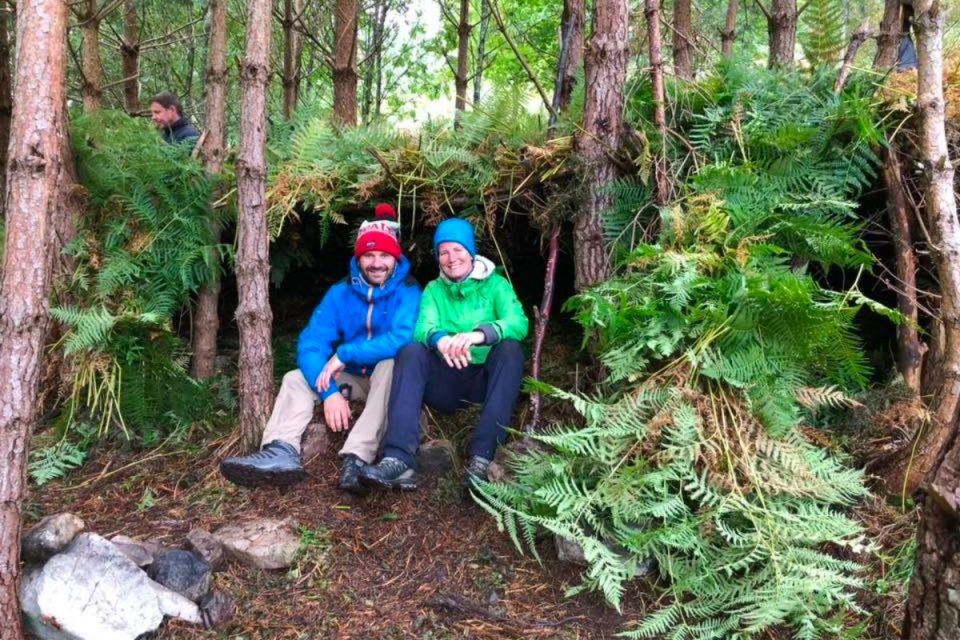In September 2019, my oldest friend Adam and I signed up for Bear Grylls’ ‘Survive the Highlands’ challenge. And this provided a good analogy for the importance of deliberate rest that I want to share with you today…
Simulating a Survival Situation
Five days, four nights, 10 men, and me – the point of the course being to simulate a survival situation. So, you sleep under the stars and build your own shelters. If you want a cosy bed, you’ve got to go out and get the moss for it. They also teach you how to purify water, navigate, and start fires. For the final 24 hours, they simulate a self rescue situation. You’re provided with the coordinates of a location you have to find. When you find it, you must use whatever make a camp: mosses, bracken, logs – they do provide tarp for shelter! They also give you coordinates for various points where some very basic food awaits. After that, you bed down for the final night…
At 6am, they asked us to radio through the coordinates of the highest point visible from the camp. So far, we’d had four days of rough sleeping: we were tired, emotionally drained, and tempers were beginning to fray. So we tried to pick some of the smaller hills in view, only to be answered with “negative,” each time. Finally, we provided the coordinates of the largest mountain, to which we received an “affirmative,” followed by, “you’ve got 40 minutes to get yourselves up there, the weather’s turning, leave no trace in camp. GO!”
Running Uphill
So, the 11 of us packed down as quickly as we could before darting up the mountain. At the top, we got a sip of coffee and a quick photo opportunity before setting off a flare. Then, the instructor, Martin, turned to us and said, “right, follow me,” and sprinted down the hill. And because it was such a high-stress situation, and everything was happening so fast, and we were all so exhausted, we just followed him unquestioningly.
I didn’t think about the possibility of a twisted ankle or broken bones as I ran through the gorse. And after about 30 to 40 minutes of running, we came to a precipice with a wire running across it. Usually, when doing something like this, I’ll clip in and sag into the harness to check everything before I go. But not this time. Because we were trying to simulate a rescue before the weather turned, they simply bundled us into a harness, clipped onto the wire and ordered to go for it across the 80-foot gap from one cliff edge to another. Upon reaching the other side, we were immediately unclipped before being sent running straight up another hill.
As we got over that last hill, we were congratulated for finishing, and told to get onto the Jeep which would take us back to the lodge. By that point, I was catatonic, but the simulated self rescue was done…
Prioritising Rest and Recovery
Now, you might be wondering why I decided to tell you this story. The reason is simple: I imagine this is how some people feel just getting through a working day. Business life can move so fast that you may not have a lot of time to think clearly. There may not be a chance to regroup and make sure you’re operating with maximum clarity and creativity. Bear Grylls will teach you that the first thing to do in a stressful situation is to stop and make sure you’re as calm as possible. Had we done that during the challenge, we probably would have done things a lot differently – I certainly would have thought twice before running down that mountain!
But I don’t want you to live your days like that: employing quick fixes to power through. Instead, I want you to prioritise slivers of recovery. Small things you can do throughout the day that mean you haven’t completely emptied the energy tank at the end of it. Combined with that, periods of deliberate rest. For example, thinning out your weekend schedule to take back control of your time. Of course not every weekend, just occasionally to ensure you’re as relaxed as you can be, rather than hurtling through life like I was during those 24 hours. Slivers of recovery, deliberate rest: that’s how you will keep chronic stress and burnout at bay.
For more content on deliberate rest, click here.
Wellbeing Resources
In the bestselling book Rise and Shine, Leanne shares her expertise and experience to show you how to spot the signs of professional burnout, recover, and go on to enjoy a happier, healthier life and career.
The Cadence Wellbeing Scorecard is a tool that helps you assess and track your progress in achieving work-life balance, managing energy and improving overall wellbeing. Take it, and receive a free, personalised report with actionable insights you can take into your daily life to optimise your health and wellbeing.


